Destructive Economic System and Challenges in Achieving the Common Good
VerifiedAdded on 2022/12/12
|6
|1293
|210
AI Summary
This article discusses the destructive economic system and its impact on achieving the common good. It explores the challenges faced by society and the role of nursing in addressing them. Proposed solutions and the importance of the common good in healthcare are also discussed.
Contribute Materials
Your contribution can guide someone’s learning journey. Share your
documents today.
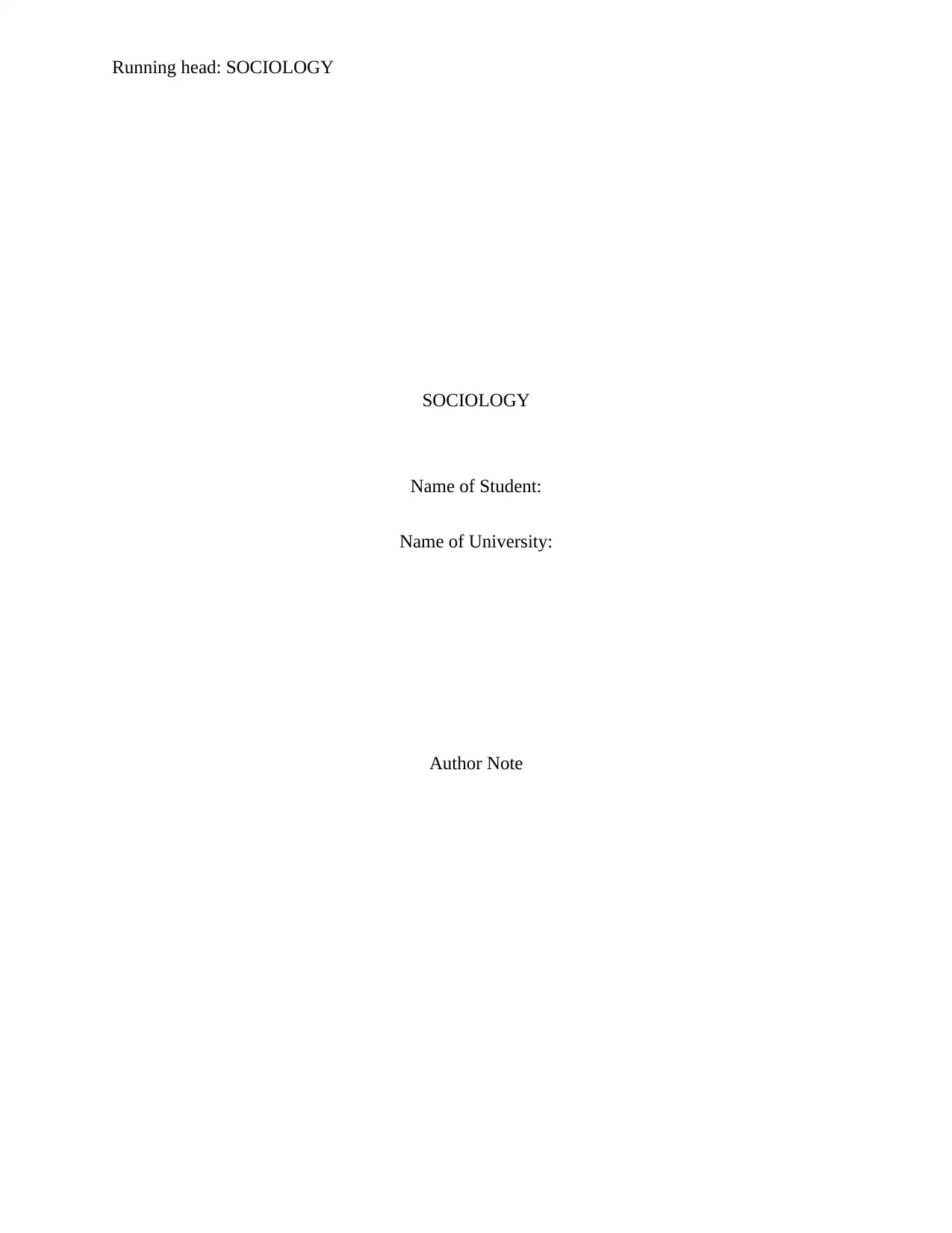
Running head: SOCIOLOGY
SOCIOLOGY
Name of Student:
Name of University:
Author Note
SOCIOLOGY
Name of Student:
Name of University:
Author Note
Secure Best Marks with AI Grader
Need help grading? Try our AI Grader for instant feedback on your assignments.
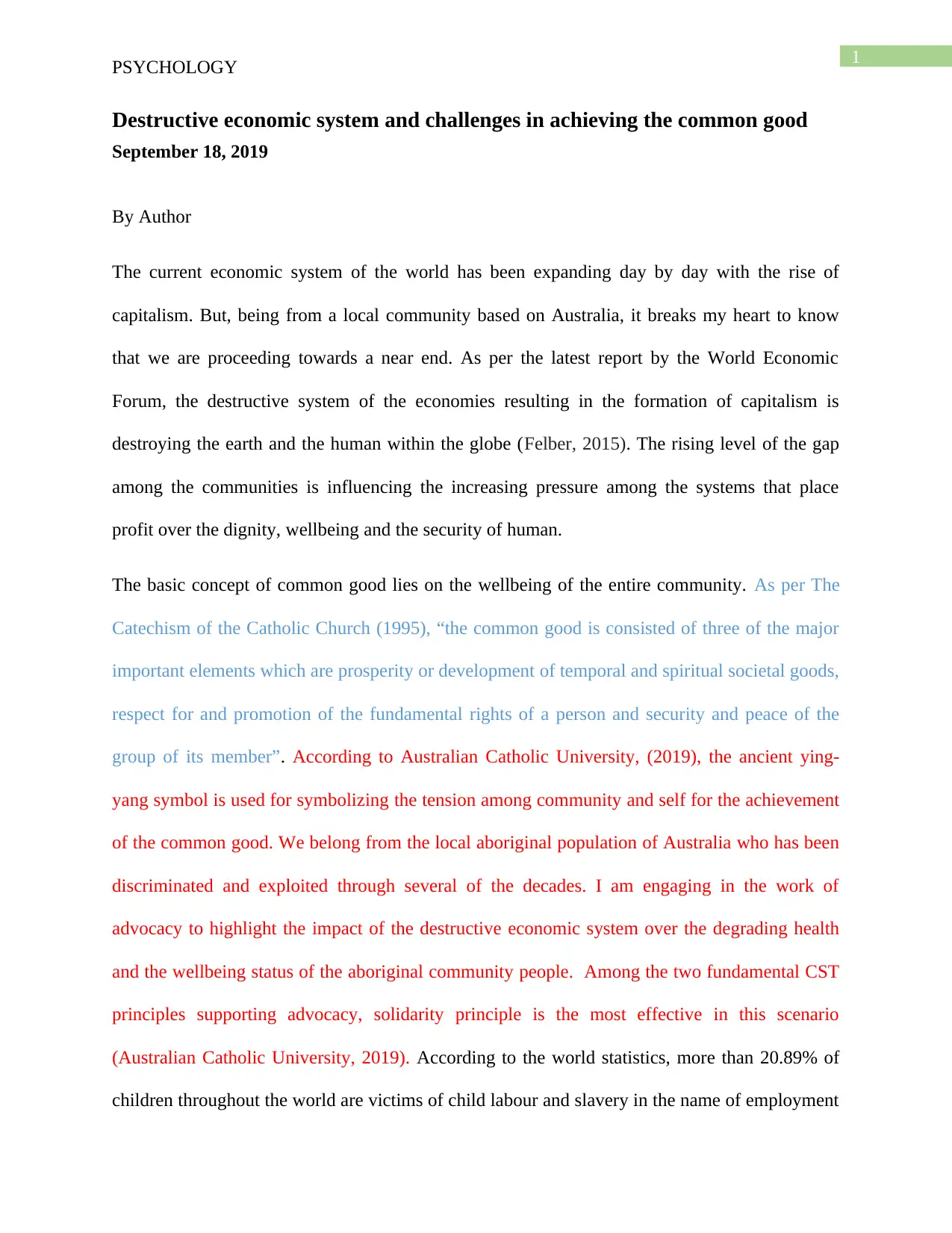
1
PSYCHOLOGY
Destructive economic system and challenges in achieving the common good
September 18, 2019
By Author
The current economic system of the world has been expanding day by day with the rise of
capitalism. But, being from a local community based on Australia, it breaks my heart to know
that we are proceeding towards a near end. As per the latest report by the World Economic
Forum, the destructive system of the economies resulting in the formation of capitalism is
destroying the earth and the human within the globe (Felber, 2015). The rising level of the gap
among the communities is influencing the increasing pressure among the systems that place
profit over the dignity, wellbeing and the security of human.
The basic concept of common good lies on the wellbeing of the entire community. As per The
Catechism of the Catholic Church (1995), “the common good is consisted of three of the major
important elements which are prosperity or development of temporal and spiritual societal goods,
respect for and promotion of the fundamental rights of a person and security and peace of the
group of its member”. According to Australian Catholic University, (2019), the ancient ying-
yang symbol is used for symbolizing the tension among community and self for the achievement
of the common good. We belong from the local aboriginal population of Australia who has been
discriminated and exploited through several of the decades. I am engaging in the work of
advocacy to highlight the impact of the destructive economic system over the degrading health
and the wellbeing status of the aboriginal community people. Among the two fundamental CST
principles supporting advocacy, solidarity principle is the most effective in this scenario
(Australian Catholic University, 2019). According to the world statistics, more than 20.89% of
children throughout the world are victims of child labour and slavery in the name of employment
PSYCHOLOGY
Destructive economic system and challenges in achieving the common good
September 18, 2019
By Author
The current economic system of the world has been expanding day by day with the rise of
capitalism. But, being from a local community based on Australia, it breaks my heart to know
that we are proceeding towards a near end. As per the latest report by the World Economic
Forum, the destructive system of the economies resulting in the formation of capitalism is
destroying the earth and the human within the globe (Felber, 2015). The rising level of the gap
among the communities is influencing the increasing pressure among the systems that place
profit over the dignity, wellbeing and the security of human.
The basic concept of common good lies on the wellbeing of the entire community. As per The
Catechism of the Catholic Church (1995), “the common good is consisted of three of the major
important elements which are prosperity or development of temporal and spiritual societal goods,
respect for and promotion of the fundamental rights of a person and security and peace of the
group of its member”. According to Australian Catholic University, (2019), the ancient ying-
yang symbol is used for symbolizing the tension among community and self for the achievement
of the common good. We belong from the local aboriginal population of Australia who has been
discriminated and exploited through several of the decades. I am engaging in the work of
advocacy to highlight the impact of the destructive economic system over the degrading health
and the wellbeing status of the aboriginal community people. Among the two fundamental CST
principles supporting advocacy, solidarity principle is the most effective in this scenario
(Australian Catholic University, 2019). According to the world statistics, more than 20.89% of
children throughout the world are victims of child labour and slavery in the name of employment
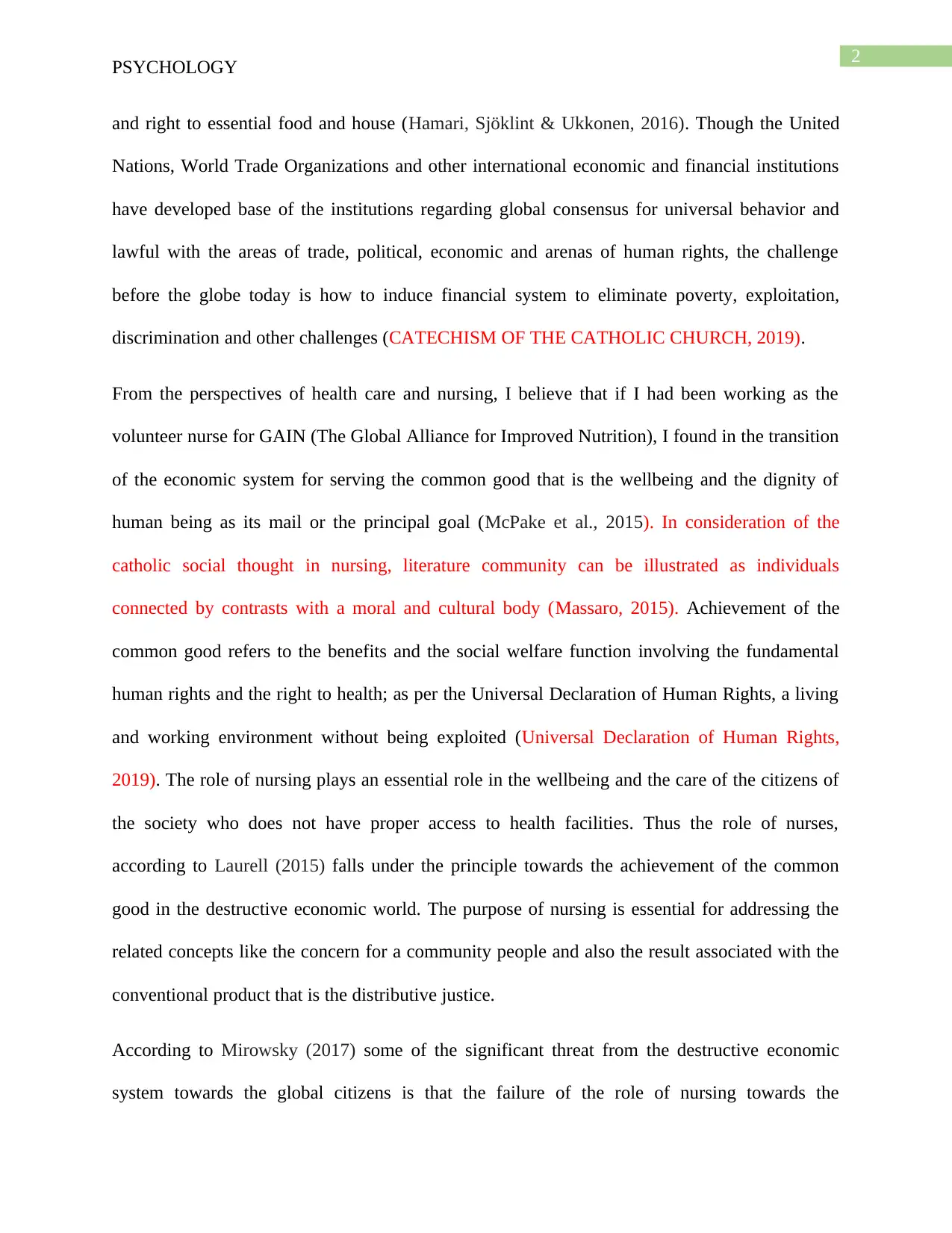
2
PSYCHOLOGY
and right to essential food and house (Hamari, Sjöklint & Ukkonen, 2016). Though the United
Nations, World Trade Organizations and other international economic and financial institutions
have developed base of the institutions regarding global consensus for universal behavior and
lawful with the areas of trade, political, economic and arenas of human rights, the challenge
before the globe today is how to induce financial system to eliminate poverty, exploitation,
discrimination and other challenges (CATECHISM OF THE CATHOLIC CHURCH, 2019).
From the perspectives of health care and nursing, I believe that if I had been working as the
volunteer nurse for GAIN (The Global Alliance for Improved Nutrition), I found in the transition
of the economic system for serving the common good that is the wellbeing and the dignity of
human being as its mail or the principal goal (McPake et al., 2015). In consideration of the
catholic social thought in nursing, literature community can be illustrated as individuals
connected by contrasts with a moral and cultural body (Massaro, 2015). Achievement of the
common good refers to the benefits and the social welfare function involving the fundamental
human rights and the right to health; as per the Universal Declaration of Human Rights, a living
and working environment without being exploited (Universal Declaration of Human Rights,
2019). The role of nursing plays an essential role in the wellbeing and the care of the citizens of
the society who does not have proper access to health facilities. Thus the role of nurses,
according to Laurell (2015) falls under the principle towards the achievement of the common
good in the destructive economic world. The purpose of nursing is essential for addressing the
related concepts like the concern for a community people and also the result associated with the
conventional product that is the distributive justice.
According to Mirowsky (2017) some of the significant threat from the destructive economic
system towards the global citizens is that the failure of the role of nursing towards the
PSYCHOLOGY
and right to essential food and house (Hamari, Sjöklint & Ukkonen, 2016). Though the United
Nations, World Trade Organizations and other international economic and financial institutions
have developed base of the institutions regarding global consensus for universal behavior and
lawful with the areas of trade, political, economic and arenas of human rights, the challenge
before the globe today is how to induce financial system to eliminate poverty, exploitation,
discrimination and other challenges (CATECHISM OF THE CATHOLIC CHURCH, 2019).
From the perspectives of health care and nursing, I believe that if I had been working as the
volunteer nurse for GAIN (The Global Alliance for Improved Nutrition), I found in the transition
of the economic system for serving the common good that is the wellbeing and the dignity of
human being as its mail or the principal goal (McPake et al., 2015). In consideration of the
catholic social thought in nursing, literature community can be illustrated as individuals
connected by contrasts with a moral and cultural body (Massaro, 2015). Achievement of the
common good refers to the benefits and the social welfare function involving the fundamental
human rights and the right to health; as per the Universal Declaration of Human Rights, a living
and working environment without being exploited (Universal Declaration of Human Rights,
2019). The role of nursing plays an essential role in the wellbeing and the care of the citizens of
the society who does not have proper access to health facilities. Thus the role of nurses,
according to Laurell (2015) falls under the principle towards the achievement of the common
good in the destructive economic world. The purpose of nursing is essential for addressing the
related concepts like the concern for a community people and also the result associated with the
conventional product that is the distributive justice.
According to Mirowsky (2017) some of the significant threat from the destructive economic
system towards the global citizens is that the failure of the role of nursing towards the
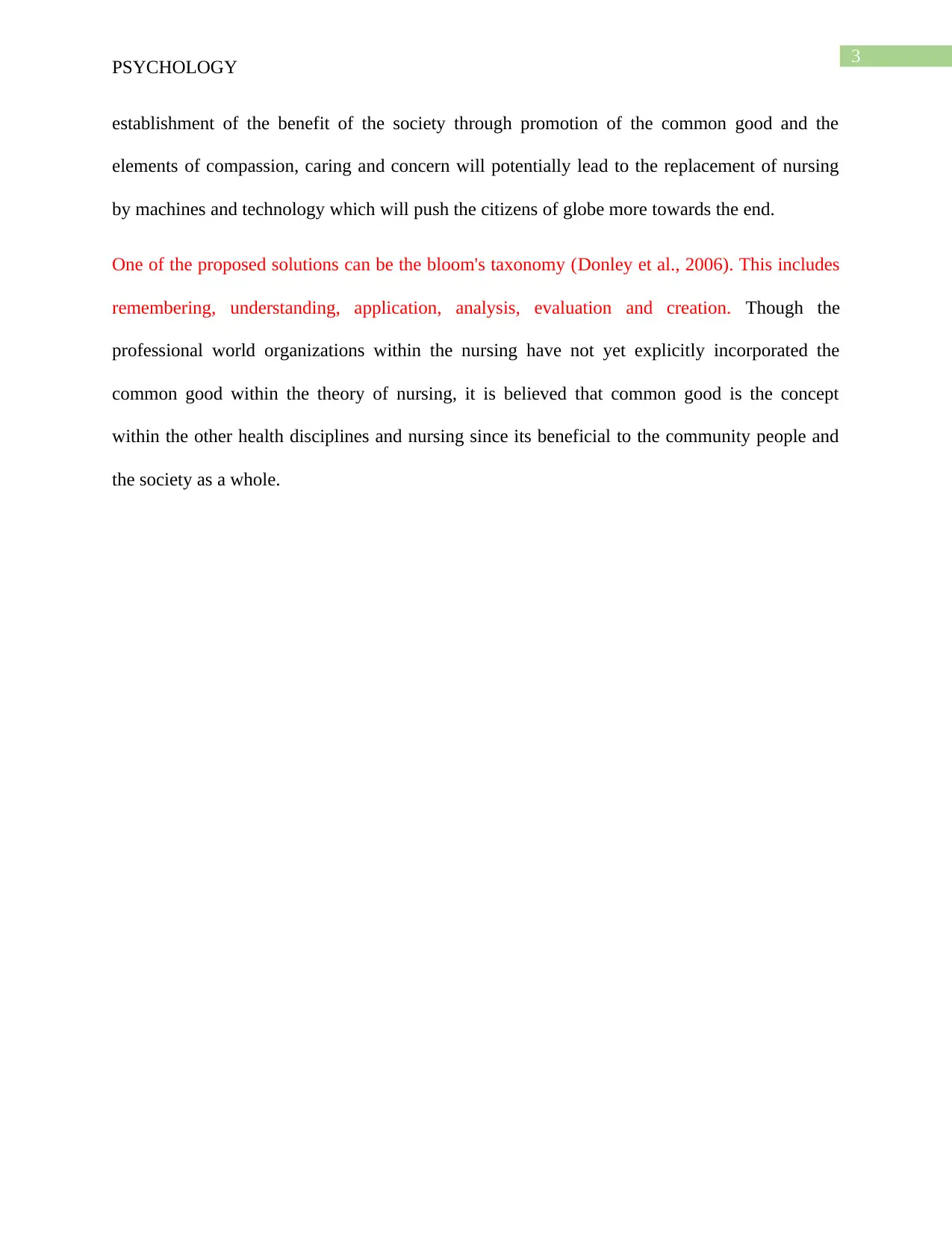
3
PSYCHOLOGY
establishment of the benefit of the society through promotion of the common good and the
elements of compassion, caring and concern will potentially lead to the replacement of nursing
by machines and technology which will push the citizens of globe more towards the end.
One of the proposed solutions can be the bloom's taxonomy (Donley et al., 2006). This includes
remembering, understanding, application, analysis, evaluation and creation. Though the
professional world organizations within the nursing have not yet explicitly incorporated the
common good within the theory of nursing, it is believed that common good is the concept
within the other health disciplines and nursing since its beneficial to the community people and
the society as a whole.
PSYCHOLOGY
establishment of the benefit of the society through promotion of the common good and the
elements of compassion, caring and concern will potentially lead to the replacement of nursing
by machines and technology which will push the citizens of globe more towards the end.
One of the proposed solutions can be the bloom's taxonomy (Donley et al., 2006). This includes
remembering, understanding, application, analysis, evaluation and creation. Though the
professional world organizations within the nursing have not yet explicitly incorporated the
common good within the theory of nursing, it is believed that common good is the concept
within the other health disciplines and nursing since its beneficial to the community people and
the society as a whole.
Secure Best Marks with AI Grader
Need help grading? Try our AI Grader for instant feedback on your assignments.
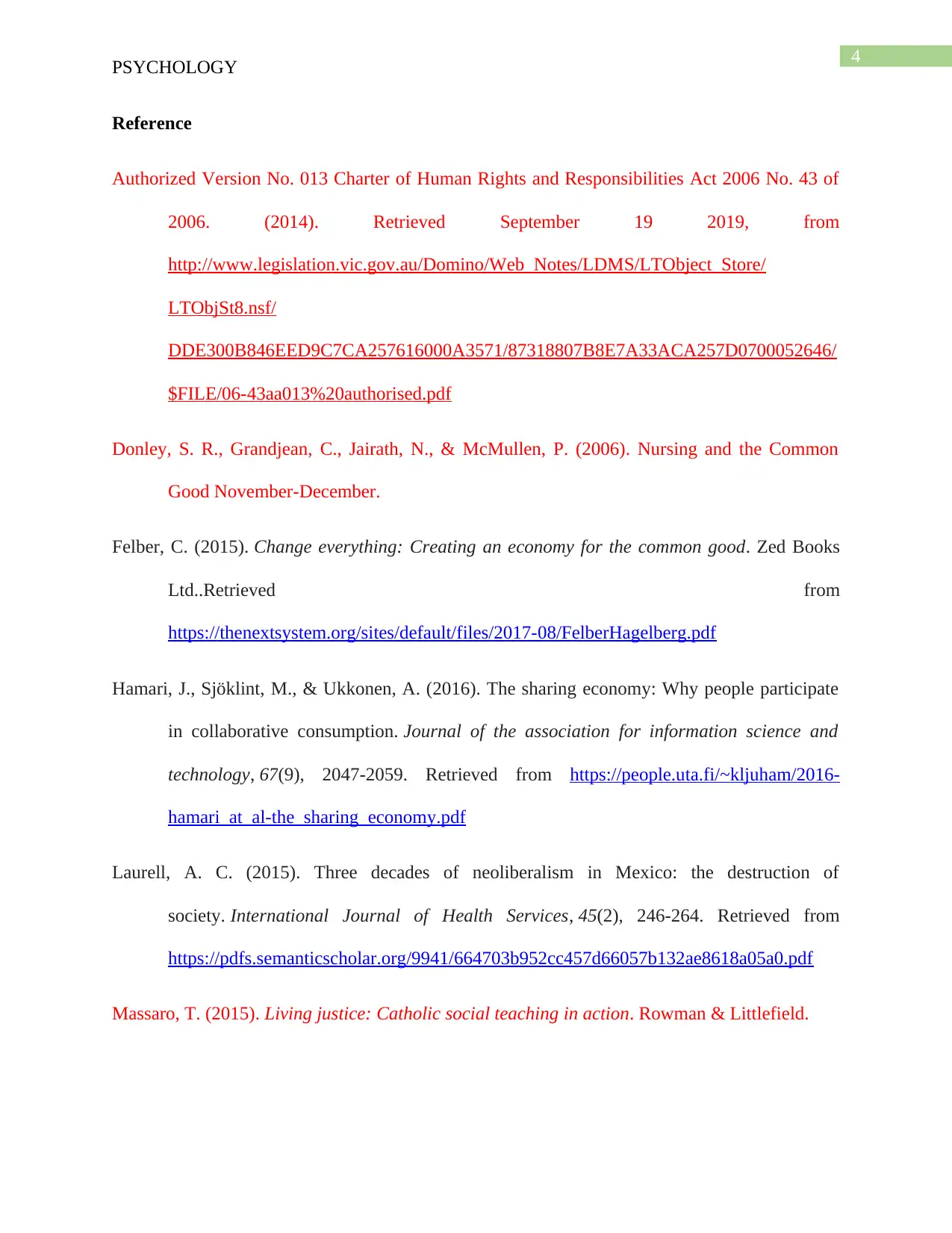
4
PSYCHOLOGY
Reference
Authorized Version No. 013 Charter of Human Rights and Responsibilities Act 2006 No. 43 of
2006. (2014). Retrieved September 19 2019, from
http://www.legislation.vic.gov.au/Domino/Web_Notes/LDMS/LTObject_Store/
LTObjSt8.nsf/
DDE300B846EED9C7CA257616000A3571/87318807B8E7A33ACA257D0700052646/
$FILE/06-43aa013%20authorised.pdf
Donley, S. R., Grandjean, C., Jairath, N., & McMullen, P. (2006). Nursing and the Common
Good November-December.
Felber, C. (2015). Change everything: Creating an economy for the common good. Zed Books
Ltd..Retrieved from
https://thenextsystem.org/sites/default/files/2017-08/FelberHagelberg.pdf
Hamari, J., Sjöklint, M., & Ukkonen, A. (2016). The sharing economy: Why people participate
in collaborative consumption. Journal of the association for information science and
technology, 67(9), 2047-2059. Retrieved from https://people.uta.fi/~kljuham/2016-
hamari_at_al-the_sharing_economy.pdf
Laurell, A. C. (2015). Three decades of neoliberalism in Mexico: the destruction of
society. International Journal of Health Services, 45(2), 246-264. Retrieved from
https://pdfs.semanticscholar.org/9941/664703b952cc457d66057b132ae8618a05a0.pdf
Massaro, T. (2015). Living justice: Catholic social teaching in action. Rowman & Littlefield.
PSYCHOLOGY
Reference
Authorized Version No. 013 Charter of Human Rights and Responsibilities Act 2006 No. 43 of
2006. (2014). Retrieved September 19 2019, from
http://www.legislation.vic.gov.au/Domino/Web_Notes/LDMS/LTObject_Store/
LTObjSt8.nsf/
DDE300B846EED9C7CA257616000A3571/87318807B8E7A33ACA257D0700052646/
$FILE/06-43aa013%20authorised.pdf
Donley, S. R., Grandjean, C., Jairath, N., & McMullen, P. (2006). Nursing and the Common
Good November-December.
Felber, C. (2015). Change everything: Creating an economy for the common good. Zed Books
Ltd..Retrieved from
https://thenextsystem.org/sites/default/files/2017-08/FelberHagelberg.pdf
Hamari, J., Sjöklint, M., & Ukkonen, A. (2016). The sharing economy: Why people participate
in collaborative consumption. Journal of the association for information science and
technology, 67(9), 2047-2059. Retrieved from https://people.uta.fi/~kljuham/2016-
hamari_at_al-the_sharing_economy.pdf
Laurell, A. C. (2015). Three decades of neoliberalism in Mexico: the destruction of
society. International Journal of Health Services, 45(2), 246-264. Retrieved from
https://pdfs.semanticscholar.org/9941/664703b952cc457d66057b132ae8618a05a0.pdf
Massaro, T. (2015). Living justice: Catholic social teaching in action. Rowman & Littlefield.
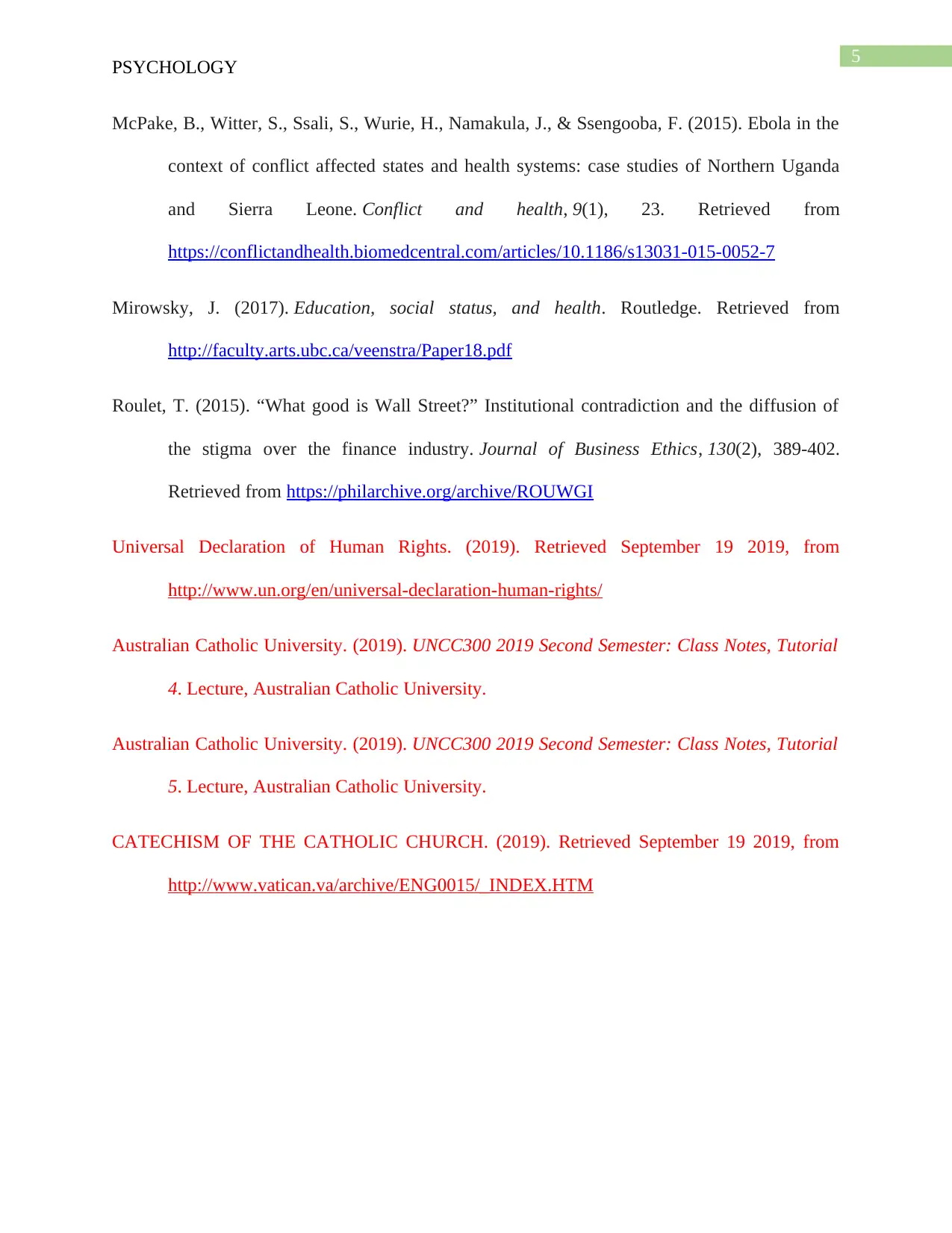
5
PSYCHOLOGY
McPake, B., Witter, S., Ssali, S., Wurie, H., Namakula, J., & Ssengooba, F. (2015). Ebola in the
context of conflict affected states and health systems: case studies of Northern Uganda
and Sierra Leone. Conflict and health, 9(1), 23. Retrieved from
https://conflictandhealth.biomedcentral.com/articles/10.1186/s13031-015-0052-7
Mirowsky, J. (2017). Education, social status, and health. Routledge. Retrieved from
http://faculty.arts.ubc.ca/veenstra/Paper18.pdf
Roulet, T. (2015). “What good is Wall Street?” Institutional contradiction and the diffusion of
the stigma over the finance industry. Journal of Business Ethics, 130(2), 389-402.
Retrieved from https://philarchive.org/archive/ROUWGI
Universal Declaration of Human Rights. (2019). Retrieved September 19 2019, from
http://www.un.org/en/universal-declaration-human-rights/
Australian Catholic University. (2019). UNCC300 2019 Second Semester: Class Notes, Tutorial
4. Lecture, Australian Catholic University.
Australian Catholic University. (2019). UNCC300 2019 Second Semester: Class Notes, Tutorial
5. Lecture, Australian Catholic University.
CATECHISM OF THE CATHOLIC CHURCH. (2019). Retrieved September 19 2019, from
http://www.vatican.va/archive/ENG0015/_INDEX.HTM
PSYCHOLOGY
McPake, B., Witter, S., Ssali, S., Wurie, H., Namakula, J., & Ssengooba, F. (2015). Ebola in the
context of conflict affected states and health systems: case studies of Northern Uganda
and Sierra Leone. Conflict and health, 9(1), 23. Retrieved from
https://conflictandhealth.biomedcentral.com/articles/10.1186/s13031-015-0052-7
Mirowsky, J. (2017). Education, social status, and health. Routledge. Retrieved from
http://faculty.arts.ubc.ca/veenstra/Paper18.pdf
Roulet, T. (2015). “What good is Wall Street?” Institutional contradiction and the diffusion of
the stigma over the finance industry. Journal of Business Ethics, 130(2), 389-402.
Retrieved from https://philarchive.org/archive/ROUWGI
Universal Declaration of Human Rights. (2019). Retrieved September 19 2019, from
http://www.un.org/en/universal-declaration-human-rights/
Australian Catholic University. (2019). UNCC300 2019 Second Semester: Class Notes, Tutorial
4. Lecture, Australian Catholic University.
Australian Catholic University. (2019). UNCC300 2019 Second Semester: Class Notes, Tutorial
5. Lecture, Australian Catholic University.
CATECHISM OF THE CATHOLIC CHURCH. (2019). Retrieved September 19 2019, from
http://www.vatican.va/archive/ENG0015/_INDEX.HTM
1 out of 6
Your All-in-One AI-Powered Toolkit for Academic Success.
+13062052269
info@desklib.com
Available 24*7 on WhatsApp / Email
![[object Object]](/_next/static/media/star-bottom.7253800d.svg)
Unlock your academic potential
© 2024 | Zucol Services PVT LTD | All rights reserved.





